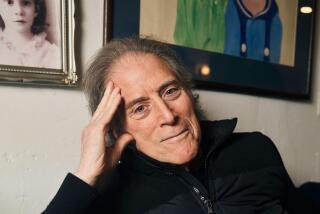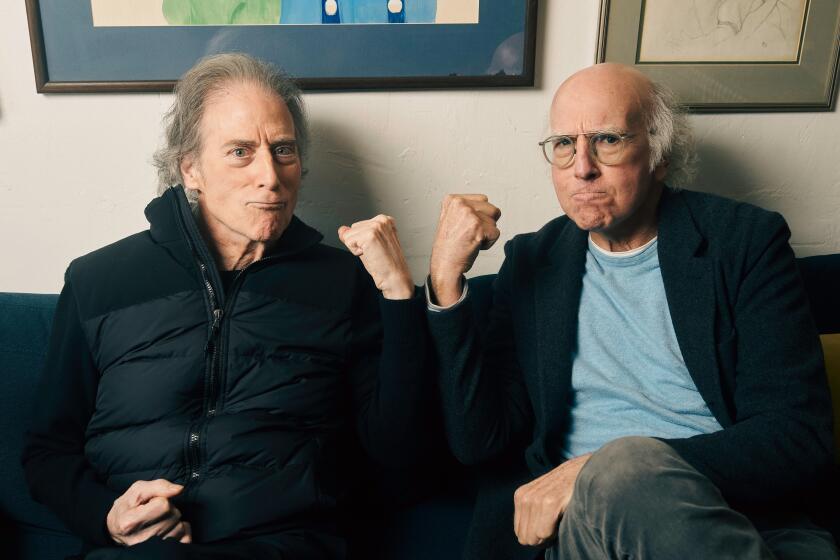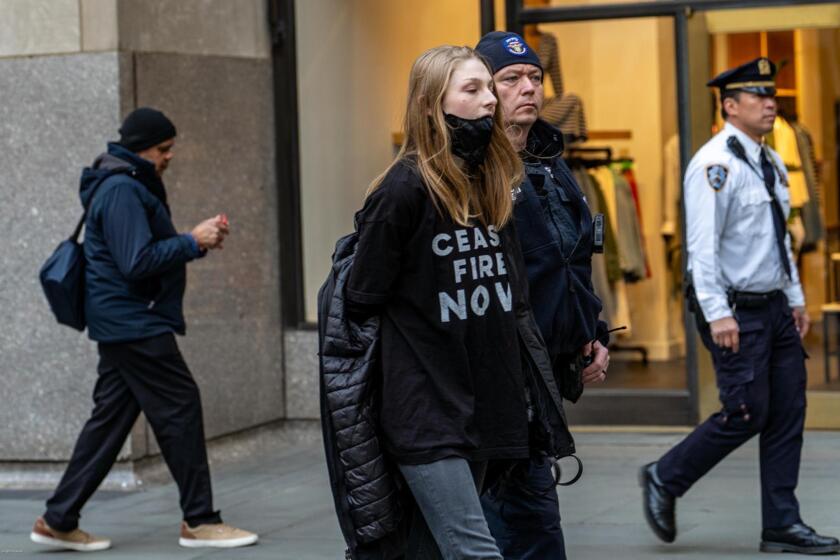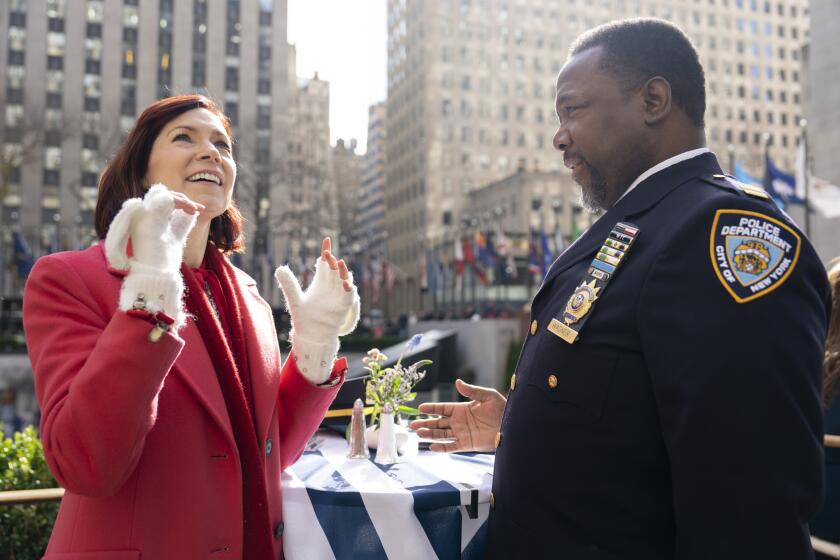Irving Link, 90210
He prepares for each day and its audiences like one of yesterday’s grand dandies. Diamond links hold monogrammed French cuffs, one circling a yellow gold and lapis watch. The tie is Italian silk, the first of an edition limited to 12, which is why it cost $250. The white hair is styled daily, professionally, and no strand dares go astray. Ever.
“No. I don’t think I have any of those,” he says. He has just been asked, rather impertinently, if he ever wears T-shirts. “But I do have two pair of blue jeans. I wore a pair once.”
Slim, calm, precise, ducal, polished, well-ordered and with one of those faces you can’t quite place but know it used to be famous, he talks of friends invited to his approaching birthday party at the Peninsula Hotel. Names are dropped from a magnum Rolodex: former Sen. George Mitchell of Washington, D.C.; Mr. Tony Bennett of New York; Washington state Supreme Court Justice Charles Z. Smith; Ahmet Ertegun, who owns Atlantic Records; and Marvin Davis, who owns just about everything else.
“I once met Ari Onassis at a party at the Beau Rivage in Lausanne and he told me the three elements of a successful man,” he remembers. There is no desire to impress, not a wisp of posturing in the telling. Or of using “Ari.” “He said, ‘Dress impeccably, have a good address and show a tan all year.’ ”
There are fade-free stories that add lingering mystique to this persona of a charming, wry and wily rascal whose only addresses for the past 50 years seem to have been the flamingo-pink Beverly Hills Hotel and the nouvelle-elegant Peninsula.
He testified against Jimmy Hoffa and was not reincarnated as a building slab. There were five-figure gin rummy games at the Friars Club in 1963 that crashed when the big loser found a peephole in the ceiling and some players wearing wires.
“These were trying times when I went from riches to rags,” he remembers. It is not a comfortable memory. “I survived because I knew I’d done nothing wrong. I just got caught up, sucked in by the criminal activities of others.”
And there, in three nutshells, is Irving V. Link, just days away from 90 and still an icon of when citizens of Beverly Hills paid $4,000 for a Cadillac convertible, $16,000 for a home and Rodeo Drive was residential.
He’s also a youthful, gentle man glowing sans peur et sans reproche while bringing a moment of grace, manners and style to largely impolite, undignified and profane times.
That’s why people, even the known and confident, seek admission to his court, to be touched by politesse: Because he’s an escape, a salve that somehow, just for a moment, delivers us from what’s out there, which is harsh and threatening.
Or as friend and New Yorker writer Adam Gopnik says: He is our perception of the ideal grandfather. Or how grandfather would be if he left grandmother home.
“People . . . ask to meet Irving just so they can say they had at last met a man who has it all figured out,” says Gopnik, now living in Paris. He sees Link as a true California type as much as any snazzy actor or wealthy courtesan. “He puts me in mind of some great performance piece. Irving is his own creation.”
Richard Koshalek, director of the Los Angeles Museum of Contemporary Art, offers another take: “He exemplifies something important about Los Angeles, which is that the fragmentation of the city, which everyone always decries, also means that there are these remarkable subcultures all around, where people with very specific, amazing plumage flourish.”
Despite Link’s vivid plumage, he is not filthy rich. Like most his age, Link relies on his Social Security check each month.
He did not inherit wealth, nor was he reared in a fine home. His father, a card-playing Talmudic scholar and rabbi, performed his own circumcisions on his sons to save money. The family of 10 was submerged in $18-a-month apartments in Harlem, Brooklyn and the Bronx.
He did not attend Harvard Business School, but PS184 on New York’s 116th Street, and the High School of Commerce.
So he chose to invent himself.
“What I have become is really available to anybody,” Link says. It helps, he agrees, to have looks that fall somewhere between Douglas Fairbanks and David Niven. Also to being stuck with a slender, 145-pound build since puberty. “But achievement is a matter of individuals crafting themselves into what they want to be, of developing physical and mental skills--and people skills.
“I’m not skillful at much. I’m not a student of many things. I had very little schooling and can’t create anything with my hands. But the one think I do have is people skills. I can sell. I know about luck and opportunity and making friends. And I’ve always been exactly who I wanted to be.”
According to those friends, he’s a man who believes religion comes from the heart, not from visiting a church. They say his emotional strength is rooted in a strong family, his children and grandchildren, and loyalty to all.
From each friendship he draws two new acquaintances to add to an ever-broadening network that eventually will profit someone--quite often Link--which neatly elevates schmoozing to a career field.
Indeed, Ari got it right. Irving Link has always been an impeccable dresser. With a great tan and a good address.
*
Midway through his own creation, Irving Vail Link (“I changed it from ‘Isadore’ when I was 25 . . . a numerologist said V as a middle initial would add rhythm, and I made it ‘Vail’ as in Colorado”) was part of Los Angeles’ salad days, when powers-that-were had regular booths in the Polo Lounge.
For 42 years, so did Link. With his own pink, plug-in phone, and Cary Grant, Elizabeth Taylor, Charlie Chaplin, Katharine Hepburn, Ivan Boesky and Tony Curtis nodding at him.
With the Beverly Hills Hotel down for four years of repairs and resuscitation--then back up last year for occupation by a new generation of deal makers and shakers--Link and like diaspora moved across Santa Monica Boulevard to the Peninsula Hotel.
It’s friendlier, he says, more European and just the place for a merry widower. The way the old Beverly Hills Hotel used to be before it was overtaken by silicon-shapes and grumpy young bucks in ponytails and Grandma Moses sunglasses.
Yet Link’s daily ritual hasn’t gone away. He walks two miles from home each morning to the hotel, for granola, bananas and berries over The Times and the trades. One cup of decaf. Then onto Wilshire and Camden and Little Joe’s barbershop, where little Giuseppe Bausoue (“I make house calls to Frank Sinatra”) coiffures, blow-dries and sprays Link’s pearl-white hair into a stiff sculpture.
Max, chauffeuring the hotel’s black Rolls-Royce, has Link back at the Peninsula around 9:30 a.m. Upstairs to the spa, into a terry robe and slippers, and out to a cabana for the first of dozens of incoming and outgoing phone calls.
Maybe a turkey sandwich lunch alongside the pool where tans are oiled umber, cellular phones tinkle incessantly, and nobody swims. Usually there’s gin rummy twice a week, Fridays and Sunday, for 5 cents a point. Sometimes dinner at Drai’s. But always the framework of a permanent schedule.
“Call me a creature of habit,” suggests Link. He doesn’t drive, doesn’t move far from the Peninsula, doesn’t shock his system with unfamiliar experiences, doesn’t get close to people who converse in negatives. “That creates stress, which is the root of bad health. A routine means I don’t worry about what I have to do this afternoon, or should be doing later in the week, or must get done by next month.
“That way, I hope to live to 100.”
*
Link, the only member of his family not born in Vienna, started work with a pair of umbrellas at age 6. “We lived on 118th Street, between 5th and Lennox, and most every day I’d hope for rain,” he says. “I’d wait by the subway with my umbrellas and help people home for a nickel.”
By his late teens, the Brolly Kid had sold the New York Times on street corners, worked for a furrier, clerked with a stevedore and logged a year of night classes at New York University.
“As a kid, I did a lot of walking,” he recalls. “From Harlem to Central Park, from 110th to 59th streets, and I’d see these magnificent buildings, the cooperatives, and the Park Plaza hotel.”
And like all the frayed-cuff kids who pressed their noses to a future, Link promised himself: “One of these days, I’ll live like that.”
In the Depression, Link’s break was another man’s bust. A novelty manufacturer went out of business, and in 1931 Link had a handshake option on a million Fortunescopes abandoned in a warehouse. Spin the arrow and everything would come up health, wealth, love and happiness by week’s end.
Link struck a deal with the warehouse owner. He would pay a 1 cent royalty for every Fortunescope sold, plus 2 cents for shipping and storage. If each toy sold for 15 cents, Link figured, the profit would be 12 cents. Times 1 million.
Then he met Nan, a cosmetics salesgirl (when that was the job description) for Thrifty Drug Co. Their first movie date was “She Done Him Wrong” with Mae West and, significantly, Cary Grant. They dined at Drake’s on 42nd Street, where 15 cents bought vegetable soup and a basket of muffins.
Two years later, they borrowed $10 to pay the rabbi and Mr. and Mrs. Irving Link went on the road.
“Our first stop was Philadelphia,” he relates. His targets were five-and-dimes, department stores and soda fountains. “On the first day I sold $100 worth of Fortunescopes, which told me I could make money in other cities.”
By bus and train, they barnstormed the Midwest, through Minnesota to Seattle, across the Dakotas and Carolinas and to Los Angeles.
“They were two great, happy, wonderful years and we sold 1 million Fortunescopes,” he says. “I figured we made $90,000 less living expenses.”
Link’s entrepreneurial sense stayed afire.
He served World War II as a civilian sales warrior after persuading the Army it should issue camouflage cream in tubes.
With peace, Link formed Beaumelle, a Glendale dressmaking partnership. Its lucrative stock in a profitable trade was wholesaling $29.75 copies of couturier originals.
“The first year, we split a $100,000 bottom-line profit,” he recalls. “The second year, more than twice that.”
The third year, the Links moved to Beverly Hills.
“The home across the street was owned by Charlie Chaplin, who was married to Paulette Goddard,” he says. “George Raft lived below on Coldwater. Donna Reed was across the street.”
The dressmaking partnership unraveled eight years later, in 1954. At 48, Link went looking for a new career and discovered real estate.
“Within two weeks of getting a sales license I sold a piece of property and on the site were built the first cooperative apartments in the area,” he says. “The sale was $660,000, my commission was $33,000.”
Link was involved in raising the first hotel around Los Angeles International Airport and sold the dirt that eventually held 51 L.A. supermarkets.
Would that his marriage had been so successful.
As Link tells it, Nan’s attention from their births went to son Rand and daughter Gale. There was no time for his work, his life and love. Despite separating ways, Link says, they stayed married for the sake of the children. Because that’s what parents used to do.
*
Link’s new path began with early morning walks that led to breakfasts at the Beverly Hills Hotel and his daily ritual. And for his family’s future, he negotiated to buy a stretch of old buildings on South Los Angeles Street.
He would borrow $3 million, but the gross annual income from his investment would be $300,000 a year and appreciating, and “I would be set for life.”
He was set for only a few months. The $3 million loan--arranged through Ben Dranow, new father-in-law of daughter Gale--came from the Teamsters pension fund.
And Atty. Gen. Robert Kennedy was at war with Jimmy Hoffa, his Teamsters and an estimated $25 million in mismanaged pension funds.
Link was subpoenaed before grand juries. He took the 5th Amendment to protect, he says, his daughter’s father-in-law. But in 1964, he agreed to testify for the government and told all at the Chicago trial of Hoffa, Dranow and six co-defendants.
Charles Z. Smith was the investigator and prosecutor. He says that throughout Hoffa’s trial he did not consider Link even a “nominally bad guy,” rather a principal witness who, with no promise of immunity, fully identified “transactions, conversations, documents . . . and carried our case for us.”
But newspaper reports connected Link to the case and slurs were sticking. Guilt was by assumption and association, albeit distant, with organized criminals. And four years later, the Friar’s gin rummy scandal came to trial.
Once more Link testified for the government, this time against five players accused and eventually convicted of cheating. An attorney for the Peephole Five, who requested anonymity, now says, “If anyone in the game was totally unaware of what was going on, it was Irving Link.”
But it didn’t matter. Link’s reputation had been smacked silly by the Hoffa trial. His life collapsed when the IRS disallowed business expenses and demanded $242,000 in back taxes.
“Everything went,” Link says. “I sold our home and our properties and moved into an apartment in Santa Monica.”
But he did have the support of a wife and his children.
“They knew that in both cases I had done the right thing,” he says. “So I really couldn’t have cared less what other people thought. I didn’t mind eating at McDonald’s.”
He picked up new work as a $15,000-a-year public relations spokesman for National Distributing Co., his brother-in-law’s liquor business. At 64, for the first time in his adult life, Link was working for someone else; a hired hand, a salaried employee.
“That was the saddest point of my life,” he says. “What I really cared about was what I had done to myself and my reputation and my self-respect. I could find excuses. I could come up with explanations. But deep down I knew. I blamed myself.”
*
Link’s 18-year sentence in the liquor business ended when NDC’s Southern California operation closed in 1988.
He had continued breakfasts at the Polo Lounge, although not as a daily habit, and the gin games continued. And Link’s knowing friends survived the Hoffa and Friar’s Club messes.
There were Harry and Marilyn Lewis--he a veteran actor, she a dress designer--who founded the Hamburger Hamlet restaurants in 1950. Another was Thomas McFall, a New York investment banker with a love for British sports cars.
McFall was also interested in the restaurant business and mentioned it to Link. Lewis had been building the chain for almost 40 years and had spoken of his weariness.
Link brought the Lewises and McFall’s investment group together. Hamburger Hamlet, lock, stock and zucchini appetizers, sold for $40 million. Link’s commission was $150,000.
“It was a new life,” he says. “Now I was a matchmaker, a middleman, an emissary.”
He organized a $250,000 condo purchase into a $400,000 resale. Most recently, he was involved with friend Asher Dann, a Beverly Hills Realtor, in the February sale of a $5.7-million Bel-Air mansion.
Link waived his finder’s fee. “He wouldn’t take a dime,” confirms Dann. “The most I can do is maybe buy a tie for him. He’s a friend.”
Believe part of that. Friends suggest that engineering something for nothing today is a smart way of setting up deals for tomorrow. It has to do with quid pro quo, creating allegiances, issuing markers.
Link is aware of his gift: “You approach this business the way you approach life. Positively. With a sense of fun, with humor, and with a certain amount of mental creativity.
“But if you aren’t sincere and are involving yourself with perceptive people who know facts from bull----, then you’ve created a negative. Then your deal’s off.”
Ali Kasikci, general manager of the Peninsula, says his friend is ideally named for his business.
“You want a Lexus, you want to buy a house, you go see Irving,” he says. “He is the link.”
*
Little Joe’s barbershop is a standard morning meld of attorneys, old actors, jewelers, an agent and Irving Link. Here, combs are still dunked in blue Barbicide, the manicurist chews gum and kibitzing is a clip from “Broadway Danny Rose”:
“Manny. Looking good. Who’s your mortician? . . .”
“That hair, that hair. You look like a movie star. Rin Tin Tin. . . .”
Link gets a 10-minute coif, stiff enough to last until July. He asks if Little Joe can make a house call because Sunday there’s a black-tie farewell to the Bistro Garden. It goes on Link’s tab that runs to about $100 a week.
It’s a good day, he says. Daughter Gale, a painter, is preparing for her first show. Link will talk with son Rand, a vice president at Sonoma State University, later in the afternoon. Sun is drenching the pool, there’s a card game this afternoon and Link’s recent investment in Koo Koo Roo restaurants seems to be holding.
He’s back on top. It yells of an easy life formed from enormous wealth, and that is a popular perception.
“I don’t know where all his money comes from,” admits Joan Luther, doyenne of Beverly Hills publicity. “It must be there, because those places wouldn’t let him not pay.”
Truth is, Link’s only regular income is $2,000 a month from Social Security. He has little investments that pay off once in a while. And there’s the occasional finder’s fee from placing eager buyers with anxious sellers from among his mother lode of friends.
“I have enough money to take care of my needs,” he explains. “Not to live elaborately, but to live as well as I can.”
There are no cars, no huge houses. Link lives in a one-bedroom condominium in Century City, a 1995 steal at $119,500. Lana Turner died next door.
“It’s where I sleep, not where I eat and entertain,” he adds. “I do that at the hotel.”
Some see his clothes--by Amir, whose clientele is an eclectic reach from Lee Iacocca to Mike Tyson, from Ted Kennedy to Mikhail Gorbachev--as a 60-suit affectation in cashmere and silk. But Link says he buys lifetime quality in traditional styles and refuses to chase wasteful, expensive fashions.
“I don’t dress for others, I dress for comfort,” he explains. “I’ve been that way since 12 when I was sweeping up the fur shop and wearing a starched collar and creased pants, because that’s what pleased me.”
Is he a horrible name dropper? Does he really know Marvin Davis?
“You have the impression that [Link] irons his socks and gets dressed in the middle of the night just to go to the bathroom,” Davis says. “I think he truly believes in the saying that anybody will be in good spirits and good temper if they’re well dressed.”
Link pays most of his way at the Peninsula. The cabana is complimentary, but only if there are no guests renting it for $100 a day. Otherwise it’s the nearest chaise.
In turn, say hotel officials, Peninsula bookings are blessed by the friends of Irving who once stayed elsewhere. Such as Tony Bennett and Sir Andrew Lloyd Webber. And others who are habitues of his gin rummy games. Such as Dann and Ken Berg, CEO of Koo Koo Roo.
“When the Beverly Hills Hotel was closed, the brother of the Sultan of Brunei came to town,” recalls Link. “I helped get them into the Peninsula. The party was 60 or 70 people with Cristal champagne and caviar all the way.
“They spent about $1 million in three weeks.”
Reason enough, says hotel public relations director Peggy Moretti, for the Peninsula to dig into its goodwill budget next month for Link’s 90th birthday party.
She knows him as a refined man with a large twinkle for young and beautiful women. But also an attentive human being who tracks the staff’s tragedies and triumphs and each Christmas rewards their caring with a $100 bill.
“When he walks through that door each morning, he brings a level of elegance with him,” Moretti says. “Mr. Link is an ambassador for this hotel, a wonderful addition to our ambience.”
*
And now the days dwindle down.
Nan Link died in 1990, her last five years connected to a respirator because of pulmonary disease. The Ambassador Hotel where they stayed in the ‘30s has been reduced to a sound stage for shooting movies that re-create those ‘30s.
Chasens. Perrinos. The Brown Derby. All gone.
George Burns. Mike Romanoff. Swifty Lazar. All dead.
Yet there are no fears in Irving Link’s life.
Only peace, thanks and lessons.
“I miss the past to a degree,” he muses. He’s drinking Evian at lunch and saving his one Chardonnay for dinner. “But I’ve adjusted to what exists now. I’ve learned to prefer the day I’m living in. If you don’t grow with the times, you grow old with the past.”
Link has tallied his life. Its rewards are “family and friends who have supported me, loved me, cared for me.” The price has been no higher than “always giving a little more than you get.”
One of these years, he knows, it will be time.
“And I’m just going to go,” he says. “But thanking God for the time I had while I was here.”
But enough of the dismal.
Irving Link has a birthday party to plan.
George Hamilton has been invited to come. And bring his tan.
Gale and Rand will be there. With Link’s grandchildren.
He wishes that Cary Grant, hero of that first date with Nan and later a friend, was still with us.
Grant always explained himself by saying he decided early in life the role he wanted to follow. He played the part so well and for so long, he became the role.
Grant, born Archie Leach in a very ordinary corner of England, set a path for both.
(BEGIN TEXT OF INFOBOX / INFOGRAPHIC)
Irving Vail Link
Age: 89.
Background: Born in New York City, now lives in Century City.
Family: Widower. Father of Gale and Rand. Grandfather of Shawn, 24, Nicole, 22, Mark, 17, Elizabeth, 11.
Passions: Dining with his children, dining with his grandchildren, reading, sun worship, gin rummy, walking, clothes, maintaining a daily ritual, the best things in life, the occasional and illegal Cuban cigar.
His measures of a man: “One, accept great success with humility. Two, accept adversity with dignity.”
Gin rummy and games versus gambling: “I like to enjoy the game. Gambling is playing for stakes you can’t afford to lose.”
Beverly Hills then: “It had class. You could breathe the air, you could trust your fellow man . . . and real estate cost $6 a [square] foot.”
Beverly Hills now: “The entertainment business is whiz kids who dine in T-shirts and jeans, and there’s no glamour. There’s a pace and pressure which didn’t exist when I was growing here . . . and real estate is $300 a foot.”
More to Read
It's a date
Get our L.A. Goes Out newsletter, with the week's best events, to help you explore and experience our city.
You may occasionally receive promotional content from the Los Angeles Times.






